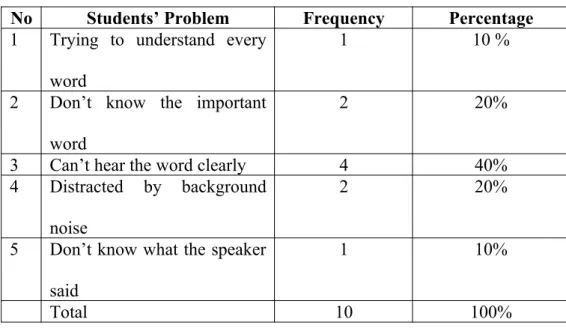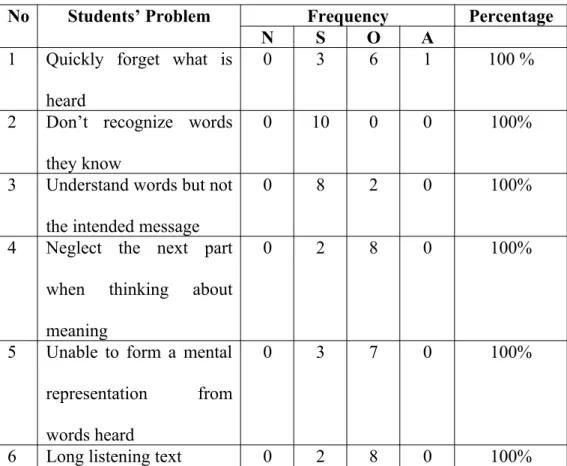The primary objective of the research is to examine students' listening comprehension problems in the third semester of the English language study program at the State Islamic College of Jurai Siwo Metro. The formulation of the problems of this research are students' problems obtained in listening comprehension in the third semester of the English language study program at the State Islamic College of Jurai Siwo Metro. Therefore, the writer will investigate the occurrence of students' listening comprehension problems in the third semester of the English study program at the State Islamic College of Jurai Siwo Metro in the academic year 2015/2016.
What problems do students encounter in listening comprehension in the third semester of the English Study Program at Jurai Siwo Metro State Islamic College?”. The writer focuses on the study of listening comprehension problems in the third semester of the English Study Program at Jurai Siwo Metro State Islamic College in the academic year 2015/2016. To recognize the listening comprehension problems of students in the third semester in the English Study Program at Jurai Siwo Metro State Islamic College.
Theoretical Basis of Listening Comprehension 1. Definition of Listening
Listening process
Prior knowledge can be knowledge about the topic, listening context, type of text, culture, or other information stored in long-term memory as schemas (typical sequences or common situations around which world knowledge is organized). Listeners use this process when they use linguistic knowledge to understand the meaning of a message. Use future stress and sentence volume features to identify important information for note-taking.
Listening Comprehension
It is a complex, active process in which the listener must distinguish between sounds, understand vocabulary and grammatical structures, interpret stress and intonation, retain what has been gathered in all of the above, and interpret this in the immediate and wider socio-cultural context. spoken. Coordinating all this involves a lot of mental activity on the part of the listener. Listening comprehension as a separate and important component of language learning came to the fore only after extensive debate about its validity.
Recent research has shown the critical role that language input plays in language learning and lends support to the primacy of listening comprehension in teaching methods. This has led Dunkel to claim that the study of listening comprehension has become the 'pole star' for building second language acquisition theory, research and pedagogy. Based on the definition above, it can be noted that listening comprehension is the understanding from the listening activity such as words, sentences and meaning.
Listening Comprehension and Language Learning
Strategies of Listening Comprehension
Cognitive strategies are more limited to specific learning tasks and involve more direct manipulation of the learning material itself.15 The cognitive strategies are related to the understanding and storage of input in working memory or long-term memory for later retrieval. For bottom-up processing, this refers to using the incoming input as a basis for understanding the message.16. Social affective strategies have to do with social mediation activity and interaction with others.17 Vandergrift (2003) defined the strategies as the techniques that listeners used to cooperate with others, to verify understanding or to reduce anxiety.
Social strategies were those which were non-academic in nature and involved stimulating learning through establishing a level of empathy between instructor and student.18.
Teaching Methods For Listening Comprehension
In this way, it is possible to raise students' enthusiasm, cultivate their listening interests, and achieve their English learning goals. When transferring cultural knowledge in language teaching, teachers must be aware that breaking down barriers is an important part of teaching culture and forms an important aspect of the whole language teaching process. Teachers need to develop students' awareness of intercultural communication, and they also need to strengthen their ability.
Intensive listening requires students to understand the meaning of each discourse and, ultimately, understand each sentence and word. In general, intensive listening requires students to listen to a text several times, or to break the text into paragraphs and sentences to understand each one; or taking dictation verbatim. Therefore, in listening teaching, there is a need to combine the development of listening skills with the development of other skills such as reading.
To improve listening skills, it is necessary to listen often to a teacher who reads well, as it is very difficult to generate.
The Listening Comprehension Problems
More than half of the students said they could not understand the full meaning of the message, even though they understood the literal meaning of the words. This is a problem of authorization because it has to do with listeners' ability to make useful inferences or act on the intended meaning of the message. The fourth most common problem reported by students was the delay of the next part of the text, when they stopped to think about unknown words or the interpretation of a part of the text.
The students reported that they failed to derive a reasonable mental representation of the input by connecting the words they heard. Students reported being unable to break speech streams into recognizable words or phrases. Based on the above explanation of the students' problems with listening comprehension, there are some problems that were most dominant.
But this factor can be overcome in some ways as students need to be careful when listening to look for key words to understand the meaning of what the speaker said. Students must be focused and fully concentrated when listening to the recorder so that they can hear clearly.
RESEARCH METHOD
- Research Design
- Data Source
- Data Collection Technique
- Interview
- Questionnaire
- Data Analysis Technique
- Approach
It was assigned to researcher and based on research objectives.3 The third semester of English study program at State Islamic College of Jurai Siwo Metro the writer has chosen as participants. To collect the accurate data from this research, the author also needed accurate data sources. The observation would be conducted in the State Islamic Collage of Jurai Siwo Metro, while the interview would target ten third semester students.
The books consist of the discussion of topics while the music, film and other relevant documents are taken from the published documents on the internet. 5 It could be inferred from this statement that what the data was should be remembered and checked through the line of questioning. The writer used the in-depth interview, because the participants were not equal to the interview.
In the open-ended questions, the author varies some questions in the form of 5WH/1H questions that allow the participants to respond in free thought, suggestions and detailed answers. The questionnaire was given to the 10 students in the third semester of the English Study Program of State Islamic College of Jurai Siwo Metro. This involves transcribing interviews, optically scanning material, entering field notes, or sorting and tabulating data into different types depending on the sources of information.
The writer should present several viewpoints of individuals and be supported by various quotations and specific evidence. The preparation of appropriate research instruments is one of the factors that determine the accuracy of research data.
DATA PRESENTATION
- Description of Research Setting
- The Historical Background of STAIN Jurai Siwo Metro
- The Profile of English Education Study Program
- General Description of Data Research
- Types of Listening Comprehension Problems Which are Very Most and Lest Faced by The Students
- Conclusion
- Suggestion
The specific objectives of PBI STAIN Jurai Siwo Metro Lampung are:. a) the students are trained to be a profound English teacher regarding religion, knowledge, technology and art. b) the students are presented as a professional English teacher who can expand the English lesson within fully Islamic motivation, (c) the students are taught. Therefore, the author conducted this research to know the students' problems in translating collocation on undergraduate thesis abstracts. So, the students who got bad score for listening were bored to listen well because it is not their language so they can't understand the meaning.
For example, to calculate the percentage of the problem of not being able to hear the word clearly, the frequency with which they face 4 is divided by 10, then times 100%. The table above tells about students' listening difficulties, namely: they don't try to understand every word, they don't know an important word, they don't hear words clearly, they are disturbed by background noise and they don't know. what the speaker said. The types of listening comprehension difficulties that students encounter most and least often.
For number 1, 6 students answered often because students often quickly forget, then remember the given text, although students could understand what was said when they heard it, they would forget it once they started listening to another part of the message . . Most students answered often because students missed the rest of a text when they stopped to think about unfamiliar words or the interpretation of a segment of text. Most students answered often because they failed to make a reasonable mental representation of the data by connecting the words they heard.
Eighth graders often responded because the text was too long and made it difficult to remember the text and the students were not focused. But this factor can be overcome in some ways as students should be careful when listening to look for the key word to understand the meaning of what the speaker said. Based on the data analysis from the finding of the result under discussion, listening comprehension problems in the third semester in the English Studies Program of Jurai Siwo Metro State Islamic College in the academic years 2015/2016, such as students felt more difficult in listening to English than English. Indonesian speaker, students are bored to listen the sound and write the word, students have problem to understand what the speaker said because they did not focus on the learning process.
Based on the above problem, the writer suggests that students need to deepen their concentration and focus in the learning process, especially in listening.

